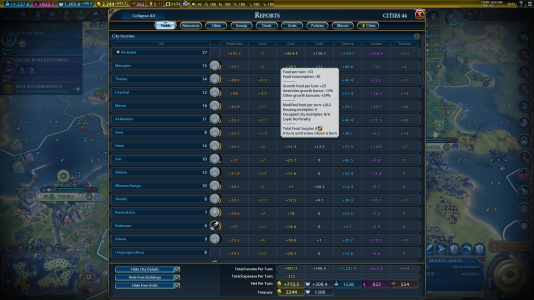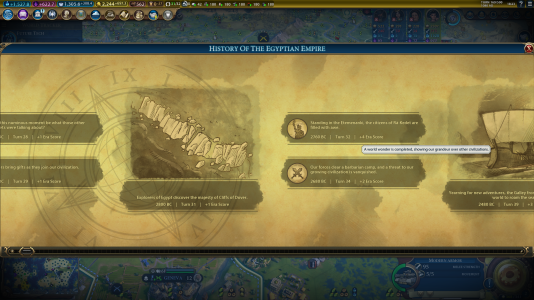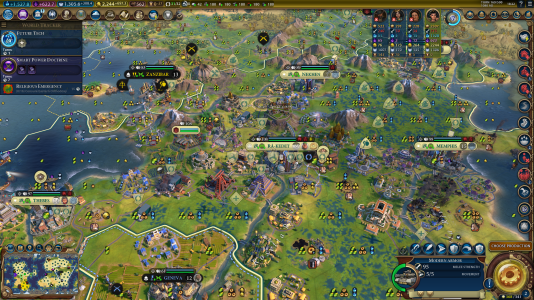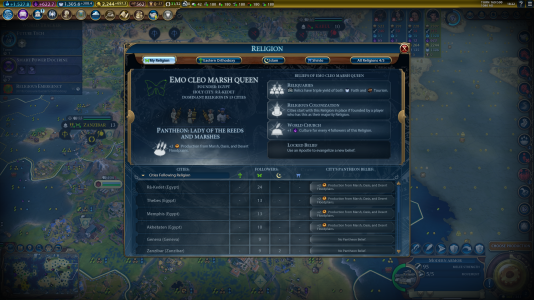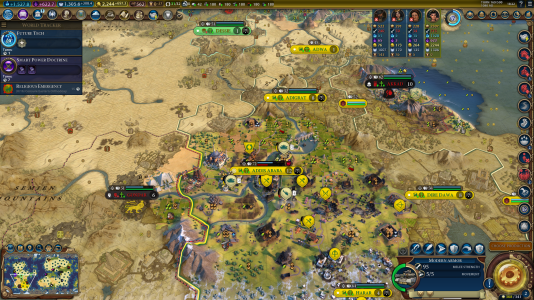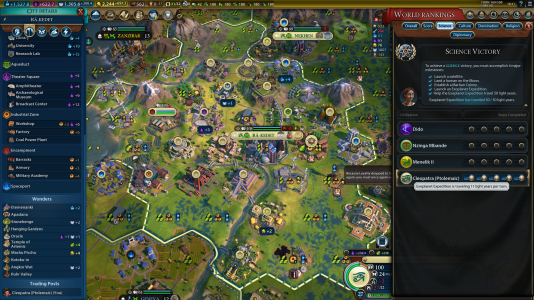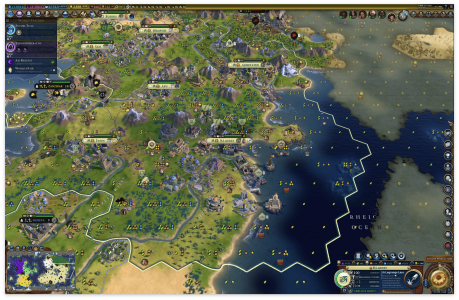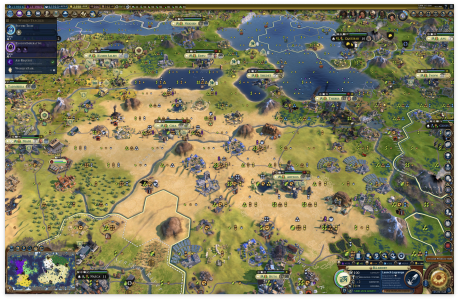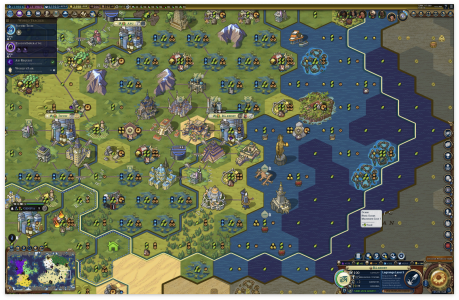I thought this was a fun map to git gud at later gave SV having come from Civ 5, so I replayed a few times. The early science from marshes is sort of a skip for anything to do with early-game science. I ended up with a turn 217 CV with a turn 219 SV lined up, haha...
In addition to some general SV strategy, I thought I ended up with an interesting SV leaning heavily on religion and wonders. I ended up with 630 faith / turn, which was amazing. I used +4 faith / wonder as religious belief, and +2 faith / city as founder belief. I could invest heavily in religious units with a good promise of later payoff. Apadama + Kilwa gave a super high payoff (+4 faith & 2 envoys bonus) to scumming any wonder I could manage, and I ended up as suz of every city-state. I also built the pearl corp in the capital, compounding my faith production even further. The desert with Nazca was a very lucrative when faith had so much value for me.
For spending that faith, I built the Govt building that let me buy military with faith, I got Moksha's district upgrade, and I took Theocracy. With that, I had a great faith-to-production pipeline that turned each faith into something like .6 hammers (or ~2.3 coins if you prefer). If I had noticed that my monumentality would run out and cut out my worker pipeline and that changing government away from Theocracy would be a huge hit to the value and spendability of my faith, I might have shaved off a few more turns, though I ended up with just enough production that I finished exoplanet project at the same time I got space lasers. I also totally forgot to purchase great people with faith even though I built oracle. Oops.
I liked how Faith + Wonder + Science fit with the civ theme. I felt that I was missing some opportunities for sphinx strategies, but I never really figured anything too useful out.
Some general SV takeaways from this experiment:
Tech & Culture:
* Power is super important to get anything out of research labs, so they need to be basically back-to-back. Probably building labs first followed by industrialization and immediate cash-buying a few power plants would be a fast plan.
* Major milestones in tech/culture are: settler policy, T1 govt, T2 govt, University, Industrialization, Art Museum, Research Labs, Broadcast Towers, oil/aluminum/uranium.
* Moving population to campus & theater districts once they have their tier-3 buildings is a good acceleration later in the game.
* Culture is only a little less important than science, and having enough culture buildings to get GP can keep culture growing.
* Pingala gives a nice early boost to culture when you are building lots of science (and the opposite for a culture game).
* T1 culture / science / gold / faith tiles can make a huge difference early, even though you can ignore them later
Money:
* Use "quick deals" mod, you will have a bad time without it.
* Consider selling all your luxuries away, even unique copies, because the happiness penalty is not that bad, and other civs will likely have duplicates for you to buy
* You can buy a lux you own from someone else who has a duplicate
* Sell your strategic resources, open borders, and diplo points when people have strong offers.
* Exploration will help you find more civs, who are all possible customers.
Going Wide:
* Chopping can be enough to build all the SV projects. Go wide with # choppables in mind.
* Wide is powerful, and keeping the wide cities small can help alleviate the amenities burden. Cities really only need to be big enough to build their buildings, then to work those buildings and do district projects late game.
* Don't building housing so that cities stay small. Don't build entertainment until it's needed
* Magnus upgrades are not as good as they seem -- losing pop is not a big deal because of the food throttling from housing limits, and IZ bonus stacking is not that important with chopping.
* Settle densely while seeking good adjacency bonuses. Getting to +4 adjacency unlocks some nice boosts, and getting those boosts in your best cities is also good. IZ adjacency controls coal plant boost. Double IZ adjacency is military for a while, so it fills any extra spots you have there. More cities at the expense of fewer tiles / city is a good trade because you can work your districts if you are low on space.
* Seek out an area where you will have a metropolis of dense cities, and plant your govt center in the middle.
Diplomatic:
* CS's can provide really amazing boosts. Suz boost can set a strategy, while the yield boosts are a key accelerator, especially when stacked.
* Commercial / trade routes are nice to have, but shouldn't be too prioritized over campus, and only rarely over theater. However, great merchants can be great, especially with monopolies on, so commercial hub > harbor when possible. Also, trade routes for getting envoys can be nice
* In addition to the obvious science wonders, the next best wonders to always pay attention to either (a) help with envoys or (b) add policy slots.
* Always provide embassy t1 after meeting a civ, or they won't accept it. Friends pay more and war less.
* Govt Plaza can increase settlers, builders, and spies, in addition to its cool adjacency bonus. Spies can get you CS suz status by killing other envoys.
Questions I still have:
* Why do people use commercial districts so much?? Trade routes seem so weak compared to civ 5, and I never see them paying off all that much. Are the commercial districts for the buildings and merchant boosts more than / equally as for the trade routes?
* I feel like I drag on culture from aphitheater to art museum. Should I do art museum before T2 govt? Do I just need to be more consistent with theater districts?






